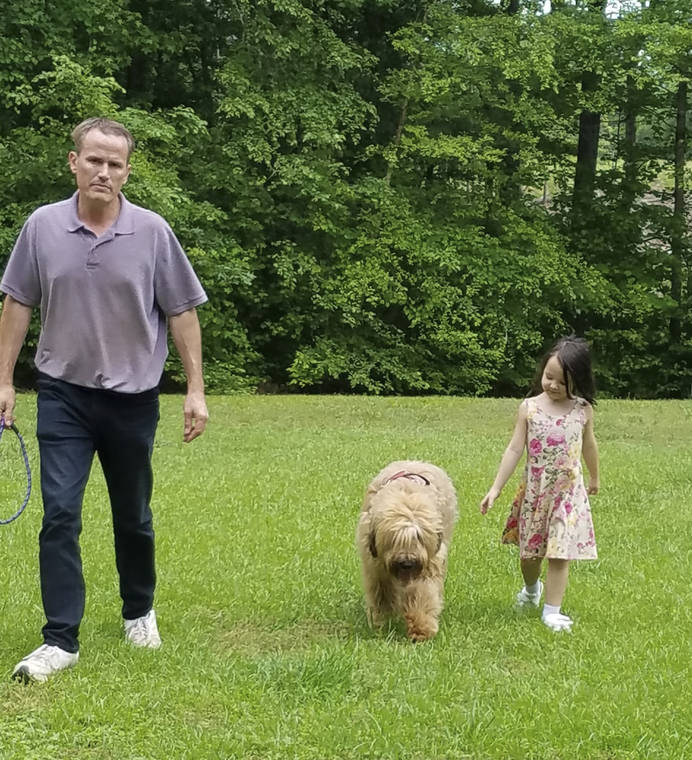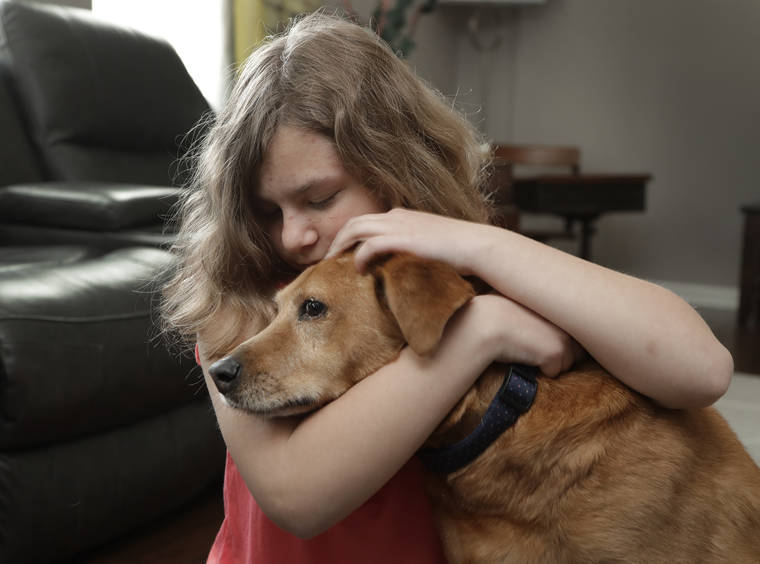APEX, N.C. — All the counseling, therapy and medication did little to ease 9-year-old Sobie Cummings’ crippling anxiety and feelings of isolation. A psychiatrist suggested that a service dog might help.
To Glenn and Rachel Cummings, Mark Mathis seemed like a dream come true. His kennel, Ry-Con Service Dogs, was just a couple of hours away, and he, too, had a child with autism. But what clinched the decision were Mathis’ credentials.
“In 2013, Mark was certified as a NC state approved service dog trainer with a specialty in autism service dogs for children,” stated an online brochure.
Ten months and $14,500 later, the family brought their “savior” home. But when they opened the front door, Okami broke from Glenn Cummings’ grasp and began mauling one of the family’s elderly dogs — all as Sobie watched.
It was only after they had returned Okami that the family learned that Mathis wasn’t a state-certified dog trainer. In fact, no state has such a certification.
The service dog industry — particularly in the field of “psychiatric” service dogs for people with autism and post-traumatic stress disorder — has exploded in recent years. But a near complete absence of regulation and oversight has left needy, desperate families vulnerable to incompetence and fraud.
“It is a lawless area. The Wild West,” says David Favre, a law professor at Michigan State University and editor of its Animal Legal and Historical Center website.
Properly training a service dog can take up to 1 ½ years and cost upward of $50,000. But the Americans with Disabilities Act does not require that a service dog be professionally trained.
“So it’s a very broad, wide-open barn door,” says Lynette Hart, a professor of veterinary medicine at the University of California, Davis, who studies the industry.
Two years ago, Noelle’s Dogs Four Hope of Colorado Springs agreed to surrender its license after state inspectors confirmed the placement of sick, poorly trained, aggressive dogs.
And last year, Virginia’s attorney general filed suit against Service Dogs by Warren Retrievers Inc., which advertises dogs trained to help people suffering from diabetes, PTSD, seizure disorders and autism. The lawsuit alleges that the diabetes alert dogs, for which Warren charged up to $27,000, were “little more than incredibly expensive pets.”
Attorneys for owner Charles D. Warren Jr. say the state’s case is based on the complaints of “a few disgruntled and fanatical consumers” who “cannot be satisfied and refuse all attempts at accommodation and reason.” A trial date has not been scheduled.
Authorities in North Carolina are now investigating Mathis.
The biotech engineer and his wife founded the nonprofit after their older son, who is autistic, was successfully paired with a service dog. In a May 2017 news release, Mathis claimed that Ry-Con — based in Apex, southwest of Raleigh — was the largest provider of autism service dogs on the East Coast and boasted a “100% success rate.”
For Rachel Cummings, that state certification “was huge.” She and her husband contacted Ry-Con in July 2017. Within days, Mathis called to say he had the perfect dog for Sobie, although he’d not yet met her.
The International Association of Assistance Dog Partners says a service animal must respond to basic commands — “Sit, Stay, Come, Down, Heel” — and be able to work without exhibiting “aggressive behavior toward people or other animals.”
But during training trips to local stores, Okami pulled at her leash and refused to lie down. At a mall, the dog growled and lunged at people and defecated in a hallway. Still, Okami “graduated” last May; the family brought her home Mother’s Day weekend.
Cummings says her two dogs were lying in the front hall when Okami attacked, unprovoked. When Mathis refused to refund their money, they sued. And then last November, he emailed clients announcing he was closing down, saying the operation was no longer sustainable. The following day, he filed for bankruptcy protection.
Not long after, complaints began pouring into state Attorney General Josh Stein’s office — more than four dozen in all.
Nancy Evans says her 19-year-old daughter, Katie, had waited over a year for her dog, Bailey. But when they got home to Toronto, the dog showed extreme aggression toward Katie’s older brother. About five weeks after giving up Bailey, Katie committed suicide, and her mother blames the loss of the dog.
Mathis accuses clients of breaking their contracts, falling behind on payments or misrepresenting conditions in their homes. In an email to The Associated Press, he insisted that his troubles all stemmed from recent financial issues.
“This is … certainly not a willful act or scam,” he wrote.
Stein, however, alleges that Mathis falsified medical records and breeder information, and contends he may have “siphoned” as much as $240,000 of the nonprofit’s money for personal expenses.
Rachel Cummings says the experience left Sobie, now 11, with PTSD.
“Her life is not what it was,” her mother says. “The light’s not back in her eyes yet.”
As for Okami, Mathis sold her to another family — with similar results. They have also filed a complaint.
———
Follow Breed at https://twitter.com/AllenGBreed




